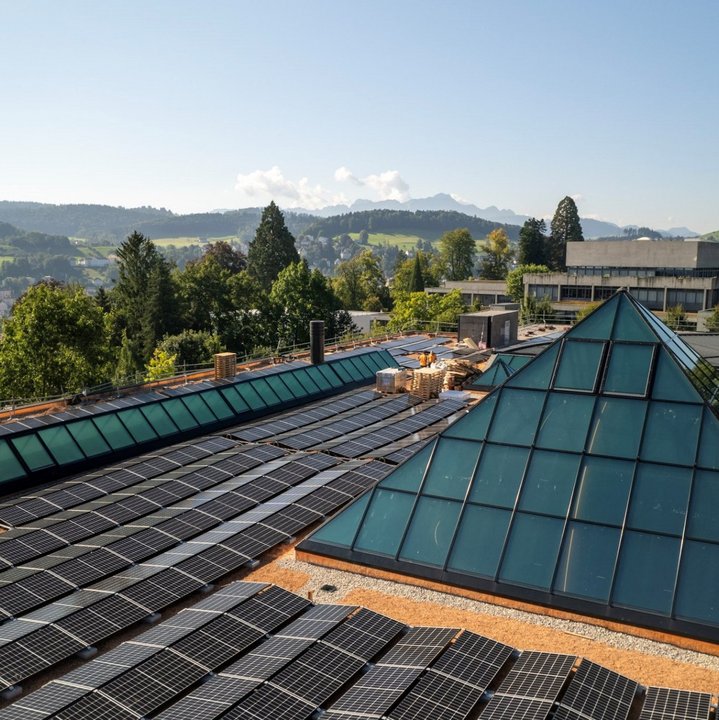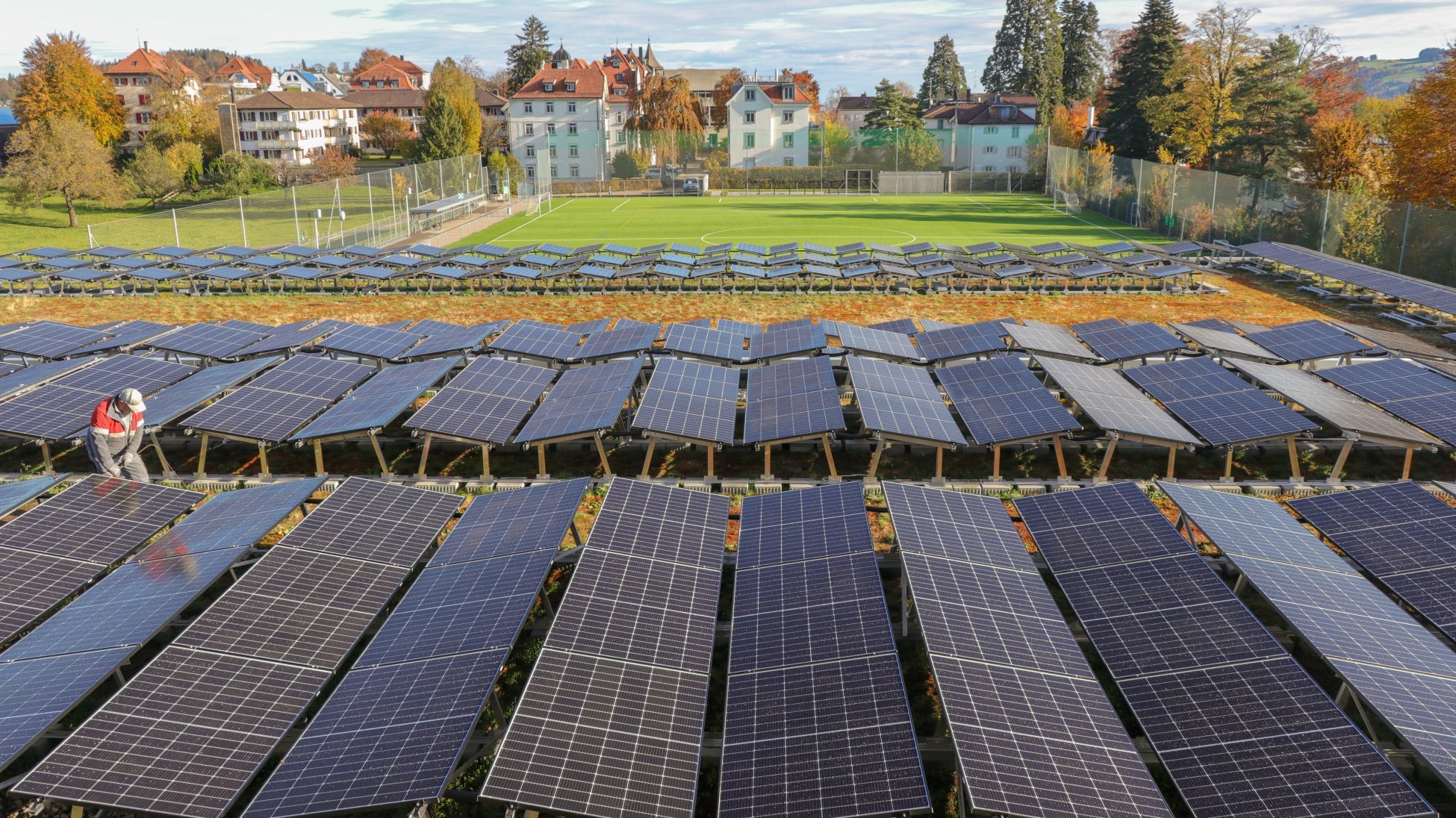
HSG’s campus offers an inspiring learning and working environment. In line with its strategic goal of ‘walking the talk’, HSG strives towards sustainable operations incl. a net zero campus, providing an inclusive and diverse space for studying and work, and ensuring responsible investments. Furthermore, we aim to make sustainability visible on campus and beyond.



In 2019, the University of St. Gallen signed the Global Climate Letter for Universities and Colleges, part of the UNFCCC’s Race to Zero campaign. Thereby, HSG has committed to achieving net zero emissions by 2030 and pledged to reduce emissions across all three scopes. Subsequently, HSG set up a university-wide greenhouse gas (GHG) accounting project to better understand our university’s footprint and to be able to identify and prioritise development projects towards net zero. A more detailed climate action roadmap is currently under development.
HSG set up a university-wide GHG accounting project based on the GHG protocol. Based on the operational control approach, the GHG inventory includes Scope 1, 2 and 3 emissions incl. downstream activities such as teaching off-site courses and student mobility travel.
The majority of HSG’s GHG emissions result from Scope 3 activities, with downstream activities, procurement, and mobility as major emission hotspots. As every GHG accounting, the calculations are an approximation partly based on assumptions and/or extrapolation.
The gained insights serve as basis for a specific net zero roadmap, which is currently under development. The GHG accounting will be continued on an annual basis to track progress towards our climate goals.
At the University of St. Gallen (HSG), down-stream activities related to student life, such as exchange travel, commuting, participation in external events, and on-site meals, represent more than 50% of the university's carbon footprint. In fact, these downstream emissions account for more than 50% of HSG's total emissions. A major contributor to this footprint is long-distance travel for exchange semesters and offsite courses, which saw an increase in emissions due to a return to pre-pandemic activity levels.
Reducing downstream emissions is challenging. Nevertheless, HSG continues to explore ways to mitigate these emissions while maintaining its commitment to providing rich learning experiences for students.
Increasing energy efficiency, decarbonizing heating and cooling, and boosting renewable power generation on campus are central goals of our climate action. HSG’s Buildings and Technology team has been optimizing energy use through innovative measures. Concretely, this led to a decrease of energy consumption by more than a third since 2013, despite the fact that the number of students has increased by almost 40% over the same period. HSG’s energy reduction sets a best practice standard among cantonal large consumers.
Lighthouse initiatives include the new SQUARE building which is heated entirely with geothermal energy, and the various PV installations that cover currently around 20% of HSG’s annual electricity demand. A remaining gas-fired heating system will be replaced in the next years.
Finally, a key opportunity for low-carbon infrastructure is the new Campus Platztor. With an expected delivery date of 2031, it is an obvious candidate for showcasing alignment with the University’s Net Zero commitment.
Based on the new cantonal public procurement law that allows sustainability as key criterion for procurement processes and decisions, HSG has revised its procurement policy to anchor sustainability aspects more firmly.
Various purchasing decisions are already informed by sustainability. For example, the university’s purchasing of electricity takes ecological criteria into consideration: 100% hydropower (market-based approach) is purchased for the main buildings on campus.
Mobility is part and parcel of any campus university. It is important to ensure connectivity and easy access while at the same time reduce environmental impacts.
Several incentives for sustainable commuting are provided for employees, such as the SBB Travel App and a carsharing option. In addition, some chairs have introduced decentral low-carbon travel policies to reduce mobility-induced carbon emissions.
Part of an organization’s indirect carbon footprint results from how it invests its funds. Inspired by a student initiative, the University of St.Gallen’s financial department has updated HSG’s investment policy to align the financial portfolio with our net zero commitment. Currently, this new policy is being implemented.
HSG undertakes various efforts to reduce emissions beyond the aforementioned emission hotspots. Many of those projects are student-driven, such as the implementation of an environmental impact labelling in the university canteen.
Since 2007, HSG has been certified for the near-natural design of its landscape by the Nature & Economy Foundation, which promotes nature in residential areas and recognises exemplary areas and environmental planning. In the last years, various efforts were undertaken to further increase the biodiversity on campus, such as façade greenings or replacements of non-indigenous species with indigenous ones.
HSG has been a Blue University since 2016. As part of its Blue Community commitment, the university promotes the consumption of tap water and the recognition of water as a public good. Over the last years, several measures have been implemented to further reduce HSG’s water consumption and to promote awareness of water issues.
HSG aims to adopt circular economy practices on campus. Our university has a comprehensive waste management system and tracks and recycles different types of waste. Furthermore, if possible, old IT devices and furniture are reused or externally refurbished. Nevertheless, reducing waste and reaching more advanced levels of a circular economy remains a challenge. For example, a pilot project to implement a reusable cup system on campus had no long-term success, unfortunately.
Equal opportunities, diversity and inclusion are central aspects of HSG's pursuit of excellence, fairness and social impact. We see diversity as an opportunity, and respect as indispensable. To ensure this, specific advice centres work on further developing the University in this regard and ensure a comprehensive advisory service.
The University of St.Gallen uses various funds to support students financially to enable access to quality education, regardless of the financial background. The related activities are coordinated by the Advice Center for Study Funding.
Furthermore, the University of St.Gallen has a significant positive impact on the surrounding region. This includes monetary and non-monetary effects, such as positive purchasing power effects for SMEs, trade, and tourism, strengthening the regional labour market, as well as innovation opportunities and positives effects on the knowledge landscape and the attractiveness of the St.Gallen region.
Transforming towards sustainability does not only include operational measures but also creating a sustainability culture on campus. Our university is working towards that through various initiatives. This includes creating awareness for sustainability issues and ensuring visibility for existing measures.
Furthermore, the strong integrative approach of our university leads to numerous interconnections and overlaps between teaching, research, student engagement, and campus. The resulting initiatives for implementing campus sustainability make our campus a living lab where learning experiences and sustainability innovation come together. For example, students from the Master’s Certificate in Managing Climate Solution successfully initiated campus projects such as the PV installation on the gym roof financed by crowdfunding, or the climate stairs. Co-curricular student engagement is another driver in this field, with numerous successful implementation projects throughout the years.